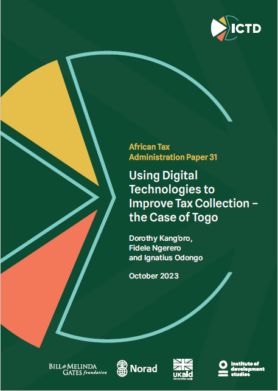African Tax Administration Paper 31
The increasing digitalisation of African economies over the past decade, and the spread of mobile money and digital financial services (DFS), has given both opportunities and challenges to tax administrations in Africa. In theory, the use of digital technologies and expanded use of DFS can provide tax administrations with access to extensive new digitised data, increase transparency, and make the overall taxpayer experience easier. All this can ultimately improve the tax administration’s performance. However, studies show that tax administrations face important challenges in how to best develop their capacity to use digitised data, and to re-align operations and skills to new digitalised operating models. This paper is a policy-oriented qualitative study focusing on Togo. Like several African tax administrations, in 2014 the Office Togolais des Recettes (OTR) embarked on digital transformation. It invested in digital technologies, including e-Services such as Tmoney and Flooz, which were developed with telecom companies and banks. Our paper aims to provide more quantitative and qualitative evidence on enablers and inhibitors to adopting digital technologies and DFS, which will help African tax administrations to fully use their capabilities. We carried out inductive content analysis on qualitative data from key informant interviews and focus group discussions with key stakeholders. We also conducted online surveys of taxpayers from large and medium-sized enterprises. We triangulated the data from online surveys with data from the qualitative methodology to provide an objective analysis of the benefits of implementing digital technologies and DFS. We identified the independent variables and drivers that are critical to achieving OTR’s objectives for implementing digital technologies and DFS, and the dependent variables representing outcomes relating to OTR’s goals. Using survey data, we developed a regression model assessing the association between the drivers and outcomes, grouping them into key outcomes.
